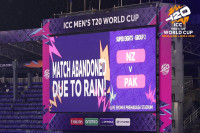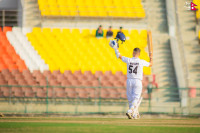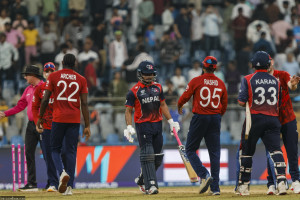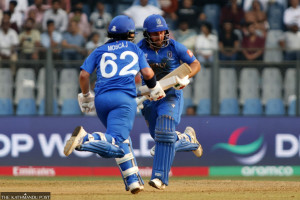Sports
The group helping women find confidence through sports
In a society where stigma and limited opportunities hold many back, the grassroots group WE United is rewriting the rules for female athletes.
Ellie Davis
Back in 2014, a group of women in Nepal who played futsal together organised an all-women’s tournament, roping in friends to serve as referees and extra players. It was a humble effort made by a bunch of women who loved playing football and also realised how sport had a deep impact on their lives, says Arpana Pradhan, a member of the organising team. “We wanted this impact to reach other girls and women,” Arpana told the Post recently.
But when national football team players unexpectedly turned up to compete, the organisers realised that women in Nepal, be it elite athletes or newbies, needed more opportunities to participate in sports.
That realisation led to the founding of the WE United Project, which aimed to create space for women to play, connect, and grow through sport. Today, the project works to create opportunities for girls and women in Nepal to participate in sports, not only as players but also as coaches. Since 2018, its coaching programme has trained 38 young women from five districts in Nepal. Four coaches currently work out of Kathmandu, running the project’s weekly all-girls football academy. The project is also supporting two coaches in Salyan, in west Nepal, and Udayapur in the east.
What began as a few women kicking a ball around on Saturdays has now grown into a grassroots movement that inculcates in girls valuable life lessons and confidence through athletics.
Arpana herself provides a testament to the benefits of sports in everyday life.
“Sport has taught me to be resilient,” says Arpana, who is now the project’s executive director. “It helps us to work under pressure and handle setbacks. It has helped me believe in myself.”
Arpana, who is now in her 30s, grew up playing sports at her school in Kathmandu, and she was used to being the only girl doing so. “From when I was a child, I thought, ‘If the boys are playing, why not us?’” Arpana recalls.
Likewise, Silika Shakya, now the project’s programme director, grew up with a love for sport, but in a home where it wasn’t encouraged. Her father was the president of a national football club, yet, ironically, he didn’t support her playing the game. But Silika, a child with big dreams, would sneak out of the house with her two younger brothers to play cricket in the neighbourhood courtyards in Patan.
“When I was here in Nepal, I thought not giving a chance for girls to play was a normal thing,” Silika says. But when she went to the United States for her bachelor's degree and studied alongside female basketball and football players, she was surprised to see women getting opportunities to pursue athletics.
“I was like, ‘What?’ Girls can play sports?” she recalls. “That transformed my perspective.” Silika then joined a tennis physical education class, and sports became an important part of her identity.
When Silika returned to Nepal, she sought out every opportunity to engage in sports and began attending WE United’s futsal games. “I joined them, and it was like, ‘This is what I’m meant for,’” she says. “Whatever they’re doing, I am ready to join hands.”
Silika participated in WE United’s first coaches’ training programme, which concluded in 2018, and has served as WE United’s full-time programme director since 2019. Getting involved with WE United has transformed her confidence, she said.
“A few years ago, I never would’ve spoken like this,” she says. “But once I became a coach, my voice got louder—more confident. Over time, I realised that I’m not the same person anymore.”
How women are finding their voice on the field
C-level certified coach Razeta Shakya has been playing futsal with WE United for a decade. She got her start while coaching the group’s training programme. This work, she said, has transformed her life.
“Coaching gave me a new kind of confidence,” Razeta said. “Through football, I found my voice, my purpose, and my strength. It helped me grow—not only as a player and a coach, but also as a person. I have learned how to handle pressure, stay focused on my goals, and bounce back from setbacks.”
Razeta hopes that her work will help the younger generation of players avoid some of the challenges she faced.
“When I first started playing, I didn’t have access to quality training or proper opportunities, especially as a girl,” she said. “Female coaches were almost unheard of, and we had to fight for even the most basic support.”
To give more opportunities for women to play, WE United also created the first all-women’s futsal league in Nepal—the Mahila Premier League—in 2017. This month-long league has run four times, and Silika and Arpana soon hope to get funding to sponsor the league again.
Even if young women do not go on to become professional athletes, WE United believes that the learnings from sports can help them off the football field. The culture within sports—teamwork and the importance of performance under pressure—they say, can build skills, such as resilience and a strong work ethic, for women; and they have research to support this belief.
In 2022, the project conducted a survey among 158 women in Nepal with a background in sports, finding that most of the women surveyed believed participation in sports had helped them achieve career success.
“At an early age, sports taught me leadership skills, value of teamwork and discipline, and the importance of appreciating people around you, taking everyone around you with you on your path as you grow,” Kaka Prerana Malla, an operations manager at an Education & Migration Agency, told WE United in 2022.
These findings provided WE United with confirmation of what they already believed. “If you want girls to succeed in their careers and feel more confident, get them into sports,” the report states.
But barriers remain. Survey respondents said that a lack of spaces to play, family pressure and social stigma add challenges for women who want to participate in sports.
That’s why the project focuses on creating safe, consistent opportunities for young girls, especially those without access to formal training.
The project also calls notable women athletes of Nepal for interviews where they share their inspiring journeys with Silika and motivate the new generation of girls in sports.
A new generation learns to play
For the past year, Razeta has been running a weekly futsal training session for girls aged 6 to 12 from the Asha Vidhyashram School in Balaju, Kathmandu. Every Friday, before school, the girls train with drills and play in scrimmages under the guidance of Razeta.
They are also training interested girls aged 6 to 14 every Saturday from 10 am to 12 pm at the Mandikatar-based Kaasthamandap Futsal Ground.
The players often shout at one another to pass and always celebrate their goals, though they didn’t always play with the same enthusiasm. “The first time they came to play, they didn’t speak a word,” shared Arpana.
The players’ perspectives on what they want to do in the future have also evolved, Arpana added.
“Previously, when asked what they wanted to become, they would say ‘nurse’ or ‘teacher’—things that are expected of women in Nepal,” Arpana said. “Now, they say ‘player’ or ‘coach like Razeta’, which is so refreshing to hear. Now they know they can be anything they want.”
Kemuna Magar, one of the roughly 20 players who attend the weekly practices, has found a love for sports through the training. “At first I was scared of playing football, but after I met everyone I started loving it,” Magar said. “After every pass I made with my friends, it became easier.”
Silika has not only impacted the lives of young girls through sports, but she’s also transformed the perspectives of her family members. Her seven-year-old son, having observed his mother’s work, sees women as capable athletes.
“My son, when I say ‘player,’ he thinks of both men and women,” Silika said proudly.
Her father, too, has changed his perspective on women in sports. “Now he fully supports me, and he is so proud of me,” Silika shared.
Recently, he even asked Silika for help in forming a women’s team for his club.
“All the things I learned on the field—confidence, leadership—I carry with me everywhere,” Silika said.
Through futsal, coaching, and safe spaces, WE United is doing more than teaching girls how to play—it’s helping them rewrite the rules of who they can become. And at a time when Nepali women’s football is reshaping how the nation sees women in sports, WE United’s work is breaking down long-standing stereotypes—one kick, one goal, and one confident girl at a time.




 19.71°C Kathmandu
19.71°C Kathmandu















